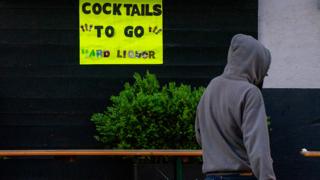Coronavirus: How the pandemic is relaxing US drinking laws
 Image copyright
Getty Images
Image copyright
Getty Images
Coronavirus has Americans picking up two new summer accessories: a mask and an alcoholic to-go drink.
After weeks of sheltering in place, many Americans are looking for ways to cut loose.
With bars and restaurants closed to the public in most states, and summer weather approaching, that means that many are heading outdoors to relax and socialise.
And for some, that means having a drink - sometimes in spite of the law.
Veteran drinks writer Amanda Schuster says that in her neighbourhood of Brooklyn, New York, "it seems like everyone's over" prohibitions on public drinking.
"It's as if people have the attitude that 'no one's going to arrest us for this when they have other things to do,'" Ms Schuster, who is the editor-in-chief for online magazine Alcohol Professor, told the BBC.
This laissez-faire approach is something Americans used to have to go abroad to experience.
While an 18-year-old can walk into a London pub and order a pint, the national minimum age to purchase alcohol in the US has been 21 since 1984, when congress passed the Minimum Drinking Age Act, in part over concerns about drink-driving fatalities.
In many countries in Europe like Germany, it is perfectly fine to go for a stroll with a beer or bring wine to a picnic. But in the US, carrying open alcohol in public is largely forbidden, except in a handful of municipalities.
A notable exception in the US is New Orleans, Louisiana, a city that proudly boasts its relaxed open container laws, giving it the feel of a European town.
"We are considered fairly puritanical when compared to other countries in regard to liquor laws," Ms Schuster says.
When the 21st Amendment repealed national prohibition in 1933, states were given the ultimate power to decide who could manufacture, sell and drink alcohol. That means that most states exercise tight control over who can sell alcohol, when, and where.
But as the realities of the coronavirus pandemic transform many aspects of American social life, many states are relaxing their rules.
Within days of enacting shelter-in-place ordinances and closing non-essential businesses, many states rescinded laws that previously restricted restaurants from selling alcohol to-go.
Others loosened rules around online liquor sales, or made it easier for customers to buy directly from breweries and wineries.
In most jurisdictions, the sale of alcohol was deemed "essential", with the exception of the US state of Pennsylvania, which closed all liquor stores.
"It's about creating revenue and helping these poor businesses," said Ms Schuster.
In addition to helping bars and restaurants stay afloat, states benefit from keeping their citizens buying booze. Taxes on alcohol serve as a large source of revenue for many states.
And as the lockdown drags on, and coronavirus stress continues, the data shows that alcohol sales show no signs of dropping.
The week that New York announced the shelter-in-place, Nielsen reported alcohol sales had gone up significantly since the same time the previous year.
And last week, they reported that the US saw the largest growth of alcohol sales since the pandemic shutdowns started in March.
It's a trend that is common in times of disaster, says Dr George Koob, the Director of the National Abuse of Alcohol Abuse and Alcoholism (NIAAA).
"We know historically that during 9/11 and Hurricane Katrina there was an upswing in alcohol consumption," he told the BBC.
With more people drinking and to-go alcohol laws being loosened to protect businesses, many local governments have issued warnings that allowing to-go alcohol sales at restaurants and bars does not change open container laws.
Alexandria, Virginia's government website states:
"Although the Virginia Alcoholic Beverage Control Authority has temporarily allowed licensed restaurants and bars to sell beer, wine and mixed drinks for carryout and delivery, the Alexandria City Code still prohibits carrying open containers of alcohol in public."
But in certain areas, there's some indication that police aren't focusing on people drinking in public.
Just over an hour north, Baltimore, Maryland has said it will dismiss pending criminal charges for people arrested for many non-violent crimes, including breaking open container laws.
The Baltimore City State's Attorney Marilyn Mosby said that this in an effort to curb the number of people in jails that are proving to be a potential "breeding ground" of the virus.
Dr Koob says it's still too soon to tell how the new to-go cup policies will change alcohol behaviour, but the NIAAA is in the process of tracking it.
However, he pointed out that with alcohol sales increasing and more people drinking, the loss of inhibition could lead to more people drinking outside.
"Alcohol's effect on the body is disinhibition. Some of these individuals who are drinking a little more because of the isolation and the stress are disinhibited so they might think it's okay to go outside for a walk and take their beverage with them."
Whether or not alcohol to-go laws will remain the norm in the US after coronavirus passes remains to be seen, but Ms Schuster thinks it will be hard "to put the genie back in the bottle".
She may be right.
On 28 April, Texas governor Greg Abbott tweeted that the state would be extending the temporary rule that allowed restaurants to serve alcohol to-go to continue past 1 May, when it was initially set to expire.
And he implied that this rule may be here to stay.
"From what I hear from Texans, we may just let this keep on going forever," Governor Abbott tweeted.